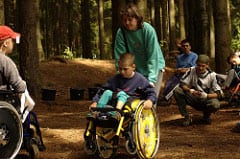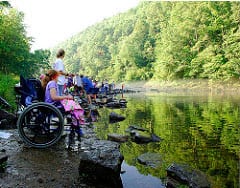Susan realized there might be more to her son’s quirks—like his inability to breast-feed, the continuous projectile vomiting, and his taking an oddly long time to drink a bottle—when a doctor said her son was aspirating.
Susan would later receive the news that her son had familial dysautonomia (FD), a progressive neurogenetic disorder.
Symptoms of FD include cyclical vomiting, unstable blood pressure, insensitivity to pain, sweating, and fever, among symptoms.
As sad and challenged as Susan has felt about her son’s sickness, she’s also had to recognize the positives.
And along the way, she’s learned 11 important things:
- Do everything you’re “supposed” to do—take advantage of special education classes, physical therapy, occupational therapy, and opportunities that may help
- Slowly, at your own pace, accept that your child may not attend college or other “milestones”
- Instead, look forward to other accomplishments, like their graduate certificate. Susan believes you should do anything that makes your child “productive” and “happy”

Don’t be afraid to roll ahead with a wheelchair! Source: www.flickr.com
- Instead, look forward to other accomplishments, like their graduate certificate. Susan believes you should do anything that makes your child “productive” and “happy”
- Give into a wheelchair for the sake of your child and family if it’s necessary
- Even if your child can’t communicate what they’re feeling, do your best to listen to their signals
- During a family vacation, Susan’s son starting becoming symptomatic. Knowing her son, Susan put him in a wheelchair and he (as well as the rest of the family) were able to enjoy a day at the aquarium
- Be patient with yourself as you adapt to an “ever-changing” reality
- Doctors’ appointments out of town? Take advantage of it and turn it into an adventurous excursion
- Realize that you learn to accept as time goes on
“You learn to tolerate the stares of others wondering what’s wrong with your child and the curious questions”
- Call on your support system—your social communities, friends, family—the people you care about most
- For fun, take advantage of cutting in lines at amusement parks—guilt free!
- Try to always prepare a Plan B—have a flexible, open mind
- Always consider what’s best for your child and your entire family

A rare condition like dysautonomia is something that doesn’t affect just the person who has it,but the whole family. And that means everyone has to go on their own journey of understanding this condition and how they’re affected by it.


